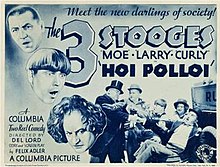| Hoi Polloi | |
|---|---|
 Original lobby card Original lobby card | |
| Directed by | Del Lord |
| Written by | Felix Adler Helen Howard (uncredited) |
| Produced by | Jules White |
| Starring | Moe Howard Larry Fine Curly Howard Harry Holman Robert Graves Phyllis Crane Geneva Mitchell William Irving Bud Jamison James C. Morton |
| Cinematography | Henry Freulich |
| Edited by | James Sweeney |
| Distributed by | Columbia Pictures |
| Release date |
|
| Running time | 17:52 |
| Country | United States |
| Language | English |
Hoi Polloi is a 1935 slapstick comedy short subject directed by Del Lord starring American slapstick comedy team The Three Stooges (Moe Howard, Larry Fine and Curly Howard). It is the tenth entry in the series released by Columbia Pictures starring the comedians, who released 190 shorts for the studio between 1934 and 1959.
Plot
In a cinematic adaptation of George Bernard Shaw's 1913 play, Pygmalion, Professor Richmond champions the belief that social behavior is predominantly shaped by environmental factors rather than inherent traits. Engaging in a high-stakes wager with his colleague, Professor Nichols, Richmond asserts his ability to refine a common individual into a gentleman through meticulous training and exposure to refined surroundings. Nichols, however, counters with the proposition to refine three common individuals, thereby testing the limits of Richmond's theory. The unwitting subjects of this experiment happen to be the Stooges, initially employed as garbage men.
Despite earnest efforts to instill proper etiquette and refinement, the Stooges continually falter in their assimilation to high society. At a lavish society party hosted by Richmond, the Stooges' comportment descends into chaos, marked by a series of comical mishaps and social blunders. These include sartorial hijinks, inelegant dancing, and a cascade of faux pas involving grooming, culinary decorum, and surreptitious theft. The culmination of their antics leads to a chaotic fracas, wherein the assembled guests unwittingly mimic the Stooges' behavior, sparking a cascade of slapstick mayhem.
Acknowledging defeat, Professor Richmond concedes the wager and presents a check to Professor Nichols. However, the attempt to smooth over the disruption with an apology to Mrs. Richmond backfires, leading to a slapstick exchange of physical retribution among the guests. Disillusioned by the superficiality and absurdity of high society, the Stooges opt to depart, only to be subjected to one final comedic blow from Richmond and Nichols.
Production notes
The idea for Hoi Polloi came from Moe Howard's wife, Helen, who was offered either screen credit or money (she took the latter). Moe later stated that the plot of Hoi Polloi was so good that it bore repeating. The Stooges reworked the film twice more, as Half-Wits Holiday in 1947 (Curly's final starring role) and Pies and Guys in 1958. Filming for Hoi Polloi was completed May 2–6, 1935.
In the first street scene where the Stooges are rubbish sanitation workers, the original "Hollywoodland" sign is visible in the distance. On the street is a marquee advertising the film Mississippi featuring Bing Crosby. Coincidentally, this film also co-stars Fred Kohler who portrayed Double Deal Decker in the short Horses' Collars released the same year.
The movie theater mentioned above was the Larchmont Theatre at 149 North Larchmont Blvd in Los Angeles.
In the Three Stooges 75th Anniversary Special, hosted by Woody Harrelson, the dancing scene with Geneva Mitchell was voted by the fans as their favorite Stooge moment of all time. The dancing sequence footage would be reused in 1941's In the Sweet Pie and Pie.
This is the first of three shorts in which Curly gets a sofa spring attached to his back. The spring gag would be used again in Three Little Sew and Sews, An Ache in Every Stake, with Shemp Howard in Hugs and Mugs and Curly-Joe DeRita in Have Rocket, Will Travel.
During the dance sequence, Larry loses his shoe. At one point actress Phyllis Crane, dancing with Moe, trips on the shoe and falls down, visibly striking her head on the floor; this was not scripted.
A colorized version of this film was released in 2006. It was not released on a Stooge DVD, but rather as a hastily added DVD bonus feature for the Jamie Foxx movie Breakin' All the Rules.
References
- Lenburg, Jeff; Howard Maurer, Joan; Lenburg, Greg; (1982). The Three Stooges Scrapbook, Citadel Press. ISBN 0-8065-0946-5
- ^ Pauley, Jim (2012). The Three Stooges Hollywood Filming Locations. Solana Beach, California: Santa Monica Press, LLC. pp. 135–141. ISBN 9781595800701.
- ^ Solomon, Jon (2002). The Complete Three Stooges: The Official Filmography and Three Stooges Companion. Glendale, California: Comedy III Productions, Inc. pp. 68–70. ISBN 0-9711868-0-4.
- Now, Chris Bungo Studios Filming Locations Then and. "Chris Bungo Studios Filming Locations Then and Now". Chris Bungo Studios Filming Locations Then and Now. Retrieved 12 November 2024.
- "barnesandnoble.com". Archived from the original on 18 February 2012. Retrieved 17 April 2009.
External links
| The Three Stooges | |
|---|---|
| Works | |
| Related topics | |
| Associated people | |
| The Three Stooges filmography (1934–1946) | |
|---|---|
| 1934 | |
| 1935 | |
| 1936 | |
| 1937 | |
| 1938 | |
| 1939 | |
| 1940 | |
| 1941 | |
| 1942 | |
| 1943 | |
| 1944 | |
| 1945 | |
| 1946 | |
| 1947 | |
| Pygmalion by George Bernard Shaw | ||
|---|---|---|
| Characters |  | |
| Films |
| |
| Musical |
| |
| Television |
| |
| See also | ||